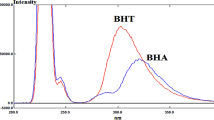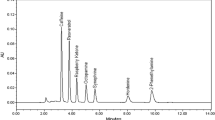Abstract
THE chief problems in the accurate analysis of vitamin D in natural products by physico-chemical methods are: (a) the elimination of large quantities of interfering sterols, vitamin A and other carotenoids; (b) the need to measure minute amounts of vitamin D by a reproducible and specific technique.
This is a preview of subscription content, access via your institution
Access options
Subscribe to this journal
Receive 51 print issues and online access
$199.00 per year
only $3.90 per issue
Buy this article
- Purchase on Springer Link
- Instant access to full article PDF
Prices may be subject to local taxes which are calculated during checkout
Similar content being viewed by others
References
Davidek, J., and Blattna, J., J. Chromatog., 7, 204 (1962).
Kodicek, E., and Ashby, D. R., Biochem. J., 57, xii (1954).
Ritter, F. J., and Martel, J., J. Chromatog., 1, 461 (1958).
Mayer, A., Picard, C. W., and Wokes, F., Pharm. Acta Helv., 33, 603 (1958).
Goldrick, B., and Hirsch, J., J. Lipid Res., 4, 482 (1963).
Nield, C. H., Russell, W. C., and Zimmerli, A., J. Biol. Chem., 136, 73 (1940).
Author information
Authors and Affiliations
Rights and permissions
About this article
Cite this article
OSIYEMI, F. Use of Sudan Black as an Indicator of Vitamin D on Thin-layer Chromatograms. Nature 211, 1192–1193 (1966). https://doi.org/10.1038/2111192b0
Issue Date:
DOI: https://doi.org/10.1038/2111192b0
This article is cited by
-
Chemische Vitamin D3-Bestimmung in Lebertran
Fresenius' Zeitschrift f�r Analytische Chemie (1972)
Comments
By submitting a comment you agree to abide by our Terms and Community Guidelines. If you find something abusive or that does not comply with our terms or guidelines please flag it as inappropriate.



